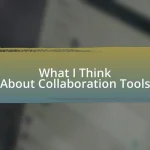Key takeaways:
- Failed projects serve as critical learning experiences, revealing the importance of communication, planning, and strategy.
- Project evaluation is essential for recognizing past mistakes and improving future workflows, fostering an environment of continuous learning.
- Common reasons for project failure include miscommunication, scope underestimation, and inadequate planning.
- Embracing vulnerability and fostering collaboration can lead to innovative solutions and a culture of transparency within teams.
Author: Charlotte Everly
Bio: Charlotte Everly is an accomplished author known for her evocative storytelling and richly drawn characters. With a background in literature and creative writing, she weaves tales that explore the complexities of human relationships and the beauty of everyday life. Charlotte’s debut novel was met with critical acclaim, earning her a dedicated readership and multiple awards. When she isn’t penning her next bestseller, she enjoys hiking in the mountains and sipping coffee at her local café. She resides in Seattle with her two rescue dogs, Bella and Max.
Understanding failed projects
Failed projects are an inevitable part of the web development journey. I remember a time when I poured countless hours into a project that I believed would be groundbreaking, only to watch it fizzle out due to poor planning. Did I underestimate the importance of a solid strategy? Absolutely, and that taught me a valuable lesson about the significance of thorough preparation.
Every failure uncovers a hidden insight. During one project that went awry, I learned that communication among team members was often overlooked. It made me realize how critical it is to foster an environment where everyone feels empowered to voice concerns and suggestions. How many times have you wished someone had spoken up before it was too late?
Reflecting on these experiences, I often ask myself what went wrong and what could have been done differently. I’ve come to understand that failed projects are not merely setbacks but stepping stones toward growth. Embracing these lessons, I’ve gained a clearer perspective on how to approach future endeavors more thoughtfully and effectively.
Importance of project evaluation
Evaluating a project is crucial because it allows us to confront the reality of our decisions and actions. I remember after completing a particularly challenging project, I gathered my team for a debriefing. We discussed not just what went wrong but also the choices that brought us to that point. I realized that reflecting on our strategies revealed patterns that could prevent similar issues in the future. Isn’t it interesting how understanding our past can drastically improve our future endeavors?
Furthermore, project evaluation acts as a roadmap for continuous improvement. During another initiative, we took the time to dissect our workflow and discovered that our testing phase was rushed, which led to multiple post-launch fixes. Considering this oversight was painful, but it highlighted the need for robust evaluation practices. It begged the question: what if we had paused to assess our workflow earlier? By recognizing and addressing these pain points through evaluation, we can foster an environment where learning from every project becomes our norm.
Ultimately, the importance of project evaluation lies in its ability to transform failure into a powerful learning tool. I’ve found that accountability emerges when we are open to scrutinizing our work. For example, after a project fell short of expectations, I conducted one-on-one sessions with each team member to dive deep into their experiences and feelings. It was eye-opening to see how different perspectives contributed to a richer understanding of the project’s overall landscape. Why wouldn’t we want to leverage these lessons to adapt and evolve?
Common reasons for project failure
When I reflect on my past projects, one clear reason for failure often stands out: a lack of clear communication. In one instance, my team worked tirelessly on a web application, only to realize, just days before launch, that we had different interpretations of the project requirements. That misalignment caused stress and urgency, which could have been avoided if we had prioritized regular updates and check-ins. Doesn’t it make you wonder how much smoother projects could flow with just a little more dialogue?
Another common pitfall I’ve encountered is underestimating the scope of a project. Early in my career, I was part of a team that took on a client’s request without fully understanding the complexities involved. We quickly found ourselves overwhelmed, leading to missed deadlines and unmet expectations. This taught me the vital lesson of thoroughly scoping projects before diving in. Have you ever found yourself in a situation where the task seemed simpler in theory than it was in practice?
Finally, inadequate planning can lead to disastrous outcomes. One project I led was significantly derailed due to our failure to allocate resources appropriately. I vividly remember the panic when we realized our developer was overwhelmed with tasks. In hindsight, we could have mitigated this by creating a more detailed timeline and resource allocation plan. Isn’t it amazing how a little foresight can save so much time and frustration down the line?
Lessons learned from specific failures
Thinking back on a project that didn’t go as planned, I recall a time when our team became so fixated on the latest technology that we ignored the client’s needs. We built a flashy interface, thinking it would impress them, only to find that usability was compromised. That experience hit hard; it reinforced the significance of staying grounded in the user’s perspective. Have you ever let excitement overshadow your original objectives?
In another project where we aimed for a tight deadline, I learned the hard way that rushing often leads to cutting corners. Our eagerness to launch resulted in multiple bugs that customers quickly identified after going live. The disappointment I felt was palpable. It drove home the lesson that quality should never be sacrificed for speed. Have you faced similar pressures that challenged your standards?
Reflecting on a particularly chaotic phase of a project, I remember when we scrambled to implement last-minute changes without a solid discussion on the repercussions. The resulting confusion not only frustrated the team but also alienated our stakeholders. That taught me the critical importance of change management—every modification must be carefully weighed and communicated. Doesn’t it make you pause and consider how much smoother transitions could be with a little more dialogue?
Applying lessons to future projects
As I move forward from past experiences, I find myself consistently applying the lessons learned from my earlier missteps. For instance, after a project where unclear communication led to mismatched expectations, I vowed to establish clearer channels right from the start. Now, I always prioritize regular check-ins, ensuring everyone stays aligned. Have you ever experienced a project derailed by assumptions?
In another situation, after navigating the fallout from a scalability issue that caught us off-guard, I learned to incorporate a more robust testing phase into every project. I vividly recall the panic that set in when our launch didn’t handle traffic as anticipated. That experience shaped my approach; I now advocate for comprehensive stress testing to avoid similar pitfalls. How do you typically prepare for unexpected challenges?
Reflecting on how I’ve tackled project planning, I’ve come to appreciate the value of iterative development. In earlier projects, I was too eager to finalize everything at once. Now, I embrace incremental releases that allow for feedback, ensuring the end product better meets user needs. This shift in strategy has not only reduced anxiety around launches but also fostered a more collaborative environment. Doesn’t it feel empowering to adapt and grow from our past errors?
Personal insights from my experiences
Throughout my journey in web development, I’ve come to realize that failure often ignites my most profound growth. I once led a project where the user interface (UI) design flopped spectacularly. I had been so focused on aesthetics that I ignored user feedback. The moment I observed users struggle with navigation, a sense of frustration washed over me. That project taught me the importance of balancing design with usability, reminding me that the end user should always be at the forefront of my decisions. Have you ever prioritized style over function and faced the consequences?
A particularly humbling moment happened during a project where we rushed to meet a deadline and ended up with a security vulnerability. The stress of the impending launch overshadowed the necessary precautions. When we discovered the issue days after going live, I felt a mix of embarrassment and urgency. It dawned on me that speed should never compromise security. Now, I always allocate time for thorough security audits, asking myself: what good is a fast product if it’s not secure? How do you ensure that resilience isn’t sacrificed for expediency in your projects?
I’ve learned that embracing vulnerability can lead to remarkable insights. During a team meeting post-failure, members openly shared their concerns and fears related to our last project. It was an eye-opening experience; instead of hiding from our mistakes, we confronted them and devised a solid plan moving forward. This practice of sharing creates a strong bond and a culture of transparency, reminding me that we’re all in this together. Isn’t it fascinating how opening up can pave the way for collective progress?
Strategies for overcoming project obstacles
When challenges arise in a project, I’ve found that adopting a solution-oriented mindset makes all the difference. There was a time when our team looked at a major technical setback as a dead end rather than a learning opportunity. By shifting our perspective to consider what we could learn from the issue, I saw team members come alive with creativity. They began brainstorming alternative solutions instead of dwelling on the problem. Have you ever noticed how a slight change in mindset can shift the entire atmosphere of a team?
Another important strategy I’ve discovered is to break down obstacles into manageable tasks. I remember a project that felt insurmountable at first due to its complexity. By dissecting the tasks into smaller goals, I not only reduced the overwhelm but also celebrated small wins along the way. This approach not only fosters motivation but also provides clear pathways for progress. Isn’t it satisfying to tick off those smaller milestones, making the larger project feel less daunting?
Lastly, I’ve leaned heavily on the power of collaboration when facing obstacles. One memorable instance was when our group faced conflicting ideas mid-project. Instead of letting frustration simmer, we organized a brainstorming session where everyone had a voice. The result was a richer outcome that incorporated diverse perspectives. It truly highlighted the value of working together to overcome hurdles. How often do you engage your team in open discussions to find creative solutions?















